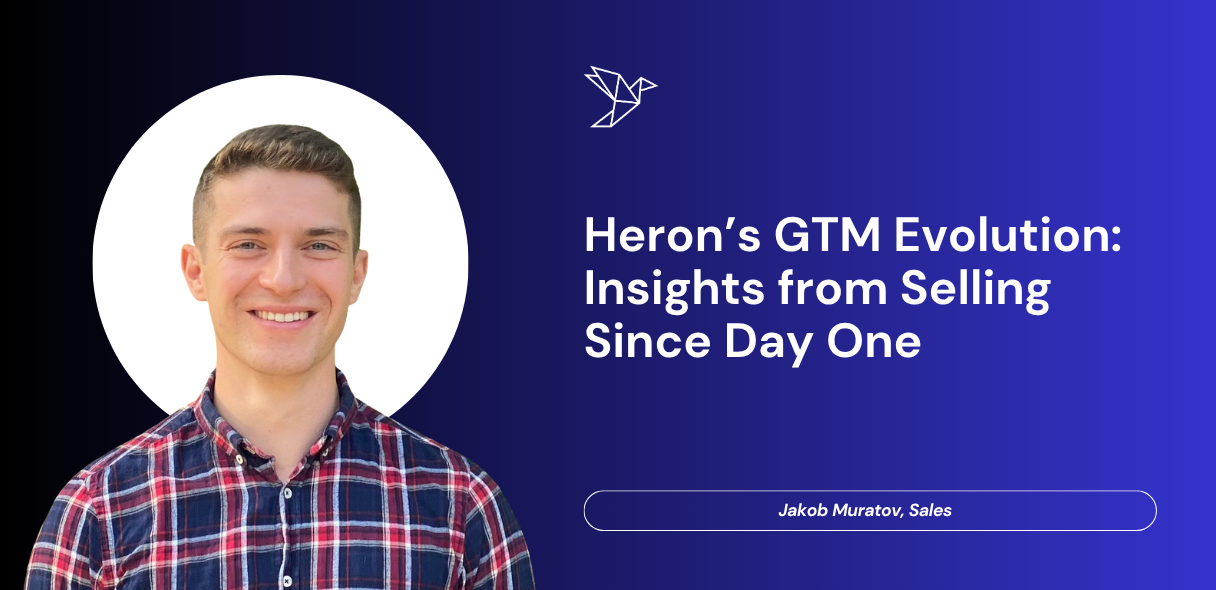When I joined Heron, as one of the company’s early hires, there was no Go-to-Market playbook. We didn’t have a defined ICP, let alone a repeatable sales process. What we had were hypotheses - and a drive to get on the frontlines with customers and figure it out.
Early GTM
Our first bet was to follow the loudest signal. VC-backed FinTechs were knocking on our door - they had big data problems, ambitious teams, and plenty of funding to experiment with new tools. We built around their needs, ran bespoke pilots, and started to see real traction. It felt like we were onto something.
But by early 2023, a year after we felt like we figured it out, the music stopped. Markets tightened, investment slowed, and many of those same customers disappeared almost overnight. The segment we’d been building for no longer existed. From a sales perspective, it was a tough pill to swallow - but it also forced us to zoom out and ask the harder question: what is the problem we’re solving? That moment didn’t just shift our sales strategy, it reshaped how we thought about product-market fit entirely.
Turning Point: Finding the Real Economy
What emerged was our most important realization: the biggest opportunity wasn’t in serving tech savvy startups - it was selling to businesses who deal with the real economy.
Small business lenders, equipment financiers, insurance underwriters - these weren’t just underserved; they were overwhelmed. Their teams were drowning in document reviews and manual inputs. And unlike fintechs chasing marginal gains, these businesses faced intense cost pressures and competition.
We saw the potential to solve a burning pain point immediately. The workflows described by underwriters were ripe for automation, and the buyers were pragmatic and eager to move faster. We’d found our market.
No Shortcuts: How We Won Our First Deals
Our first breakthrough came the old-fashioned way: by showing up. We flew to Florida to sit beside credit underwriters and data processors, watching them squint at bank statements, scrolling through long business loan applications just to find relevant details to input into their systems. We saw teams manually verify document fields line by line - a process that seemed great for automation.
That trip led to our first proper customer in SMB lending. But more importantly, it gave us confidence that this problem wasn’t just big - it was frequent. The same workflow pain points showed up everywhere.
Our early sales didn’t come from slide decks. We didn’t have a mature platform or partnership credibility. What we had was trust: we listened, we customized, and we followed through. One customer told us Heron saved her so much time, she finally had a moment to go grab a coffee in her packed days of reviewing business loan applications. That might not sound revolutionary - but when you multiply that kind of win across an industry, it adds up fast.
The Scrappy Stuff Works
We also weren’t afraid to get creative. I once hand-delivered cookies to a lead in Manhattan, along with a handwritten note about their recent press release. It was 95 degrees outside. But it worked - we booked the meeting, ran a trial, and converted the account.
That kind of hustle - to do the things that don’t scale - has defined our GTM to this day. We go to conferences. We meet customers in person. We listen deeply. And we move fast to ship what matters.
Today: A Growing Foothold and Word-of-Mouth Flywheel
Heron now has a strong foothold in SMB lending. Our product is more mature. Our brand is known. And our sales motion has evolved from reactive to proactive - supported by word-of-mouth referrals, customer testimonials, and a reputation for shipping quickly and delivering real value.
Still, the fundamentals haven’t changed:
- Talk to customers.
- Obsess over their workflows.
- Solve real problems.
- Earn trust.
The Opportunities Ahead
What’s most exciting to me isn’t what we’ve done - it’s what’s still out there. There are hundreds of document-heavy industries where software adoption has lagged. Where people still manually key in data from PDFs. Where operational costs drag down business outcomes.
These industries don’t need more buzzwords. They need tools that work in their current systems, from people who care enough to understand their pain.
Heron is just getting started. And the opportunity is massive.
Learn more!
Book a demo ->


